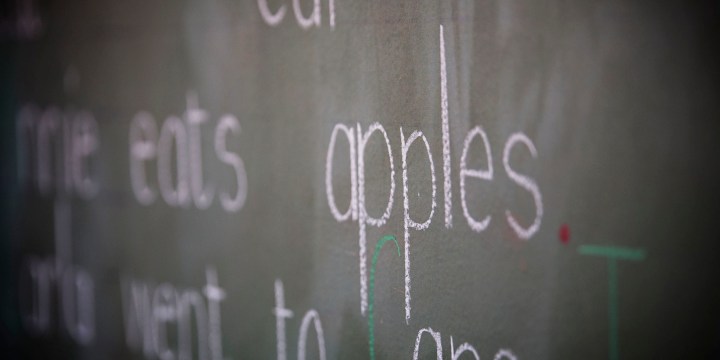LITERACY CRISIS
A proposal to upskill the 81% of Grade 4 children in South Africa who can’t read

We propose that the Treasury provides an additional conditional grant to enable provincial education departments to ensure that improving reading skills is adequately and equitably provided for across the poorest-performing provinces.
The recently published 2021 Progress in International Reading Literacy Study (Pirls) found that 81% of Grade 4 learners in South Africa can’t read for meaning. This is up from 78% in 2016, largely on the back of the Covid-19 pandemic.
The study showed that Grade 4s lost the equivalent of 80% of a year of learning between 2016 and 2021, while others show Grade 1 and 2 learners may have lost more than one full year of learning. South Africa was making small gains in reading in the decade before Covid-19. The Pirls results show that our literacy levels are now back to where they were in 2011 (when 82% of Grade 4s couldn’t read).
Our system has lost a decade of slow, but steady progress.
Read more in Daily Maverick: From bad to worse: New study shows 81% of Grade 4 pupils in SA can’t read in any language
The steepest declines were found across the more rural provinces of Limpopo, Free State and Mpumalanga, where teaching is largely delivered in Sepedi, Sesotho, isiNdebele, Xitsonga and Setswana.
The results particularly reinforce what we already know about the effects of the pandemic on learning for disadvantaged learners in no-fee schools, who were in grades 1 to 4 with little grounding in foundational reading skills over that period. It widened already large inequalities between no-fee and fee-charging schools. Without an urgent, large-scale and effective response, this generation will experience poor learning outcomes, which will lead to higher dropout rates, and increased levels of inequality, future unemployment and poverty.
Jim McKeown at Masinyusane, a literacy after-school programme, says, “We are failing our children. We were failing them before Covid-19 and we are failing them again now. We must do better. No excuse is acceptable.”
What can be done?
Professor Ursula Hoadley at UCT reminds us, “There is a lot of international evidence of the impacts of school closures, and global policy recommendations were made early in the pandemic. Most focused on finding additional time, accelerating learning, conducting baseline assessments and addressing children’s psychosocial needs.”
We know that unremediated learning backlogs grow over time and that disadvantaged learners are the most affected. Given the size, depth and complexity of the problem, the Department of Basic Education’s (DBE’s) response to learning losses is wholly inadequate, and there is general consensus that the government cannot do it alone.
According to Hoadley, “The system has no existing remedial structures to draw on even though the problem of backlogs existed before Covid-19. The revised curriculum hardly takes into account that a lot of learners are behind by a grade or two, or behind in critical areas, and nationally, there is no funded plan for catching up learning loss.”
It is our understanding that the DBE’s coffers are constrained and committed, with no budget allocated to the learning recovery, which essentially places a further burden on overstretched schools and teachers to address learning backlogs.
As an alternative, we propose that the Treasury provides an additional conditional grant to enable provincial education departments to ensure that what is clearly a national priority is adequately and equitably provided for across the poorest-performing provinces. When Maths, Science and Technology became a focus of the national government, there was a conditional grant to fund proven initiatives to promote these subjects. We also need one for reading.
Out of all the provinces, the Western Cape’s Pirls results show the smallest decline. Yet it is leading the pack in catch-up response with its recently launched R1.2-billion #BackOnTrack programme. The initiative provides children in grades 4 to 7 with additional learning time on targeted subjects and access to after-school programmes.
The role of nonprofits
For the worst-affected provinces, a conditional grant would be the necessary lifeline to act urgently and decisively, and partner with civil society partners to support the overstretched teaching workforce.
Working independently of, but together with the government, are a myriad of education nonprofits with many years of experience in education support and accelerated catch-up interventions.
An experienced nonprofit leader in literacy, Mammuso Makhanya of Wordworks, says: “If we are to succeed, we must begin this struggle for children’s literacy in homes and communities. The struggle for democracy was won by ordinary people taking a stand against injustice; and a generation of young people who cannot read is another injustice that we must not accept.”
The authors of this Op-Ed are the directors of some of these nonprofit organisations. Our interventions operate inside and outside of classrooms, and range from providing printed and digital learning resources, training and supporting previously unemployed young people as education assistants, raising parents’ and caregivers’ awareness of the critical need to read regularly with their children, delivering nutrition, co-curricular and dedicated after-school interventions, and increasing access to libraries and books.
In addition to inculcating literacy and numeracy, many of our programmes seek to develop socio-emotional learning skills. Our interventions are delivered in partnership with private donors, schools, districts and provincial departments, and seek to leverage public funding.
Much of the work being done by civil society speaks to the international recommendations around extending learning time, focusing on foundational learning and addressing psychosocial needs. For example, Wordworks’ Time initiative engages teachers, parents, government departments and community-based NGOs around at-home and after-school learning for almost 57,000 Grade R and Grade 1 learners, and the Catch-Up Coalition comprises more than 40 organisations providing additional learning time in foundational literacy and numeracy to about 300,000 learners in grades R to 5.
While this level of collaboration is complex, we know that as civil society organisations we need to work in a more cohesive and coordinated way to strengthen and support government efforts towards more effective partnerships. We are encouraged by the work done by the Independent Philanthropy Association of South Africa (Ipasa) and the National Association of Social Change Entities in Education (Nascee) to promote and support collaborative approaches.
There are opportunities within the ecosystem that can be leveraged to improve learning outcomes; for example, the Presidential Employment Stimulus (PES) which places hundreds of thousands of young people in classrooms and NGOs.
We know from Funda Wande’s work in Limpopo that with effective recruitment, training and mentoring, school assistants can enable improved literacy outcomes. There is a lot of research to show what works and what should be scaled, much of it conducted by the DBE itself. We need to deliver results quickly and at scale, which requires cohesive partnerships between the government and civil society.
This community of innovative social entrepreneurs and their donors is committed to ensuring that this generation of children is not lost. We all need to work more collaboratively and with urgency. Delivering catch-up programmes to the learners who need them most requires resources. We believe that a conditional grant should be allocated to provinces that do not have the funds to contract and partner with organisations that can tackle the catch-up imperative head-on. DM
This op-ed was co-authored by the directors of the below-listed organisations. Together, our collective reach is just under 1,000,000 learners in grades R to 5; approximately 15% of those in the system.
- Beautiful Gate South Africa
- Click Learning
- Funda Wande
- Masinyusane
- Nal’ibali
- Social Innovations
- The Bookery
- Wordworks
- Binding Constraints Lab (represented by Joy Olivier)
- The Learning Trust and its Catch-Up Coalition of partners

















Comments - Please login in order to comment.